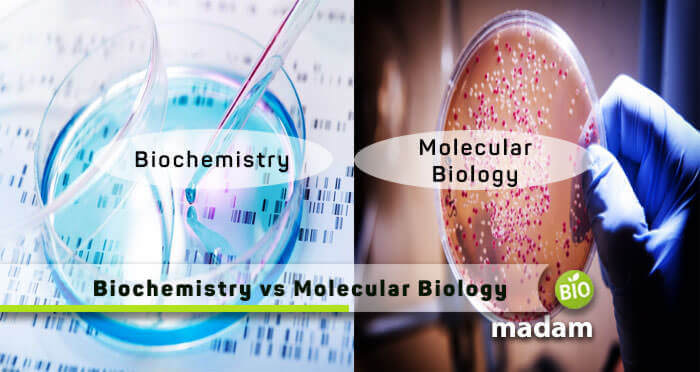Recently updated on October 5th, 2023 at 09:35 am
Biology is file biology is the field of science that studies living organisms and their vital processes. Biology is subdivided into different branches covering all aspects of organisms such as morphology, physiology, anatomy, behavior, origin, and distribution of living organisms. Biochemistry and molecular biology are two such disciplines, dealing with the structure, and function of biologically important molecules and their reactions.
The main difference between biochemistry and molecular biology is that biochemistry is the science that deals with the chemistry of living things, while molecular biology is the study of living things at a molecular level. A major in both these fields of biology trains you in the experimental techniques used to probe and study different structures and functions of biologically important molecules. We’ll further look into the details of both subtypes in terms of their differences.
Comparison Table
| Parameters | Biochemistry | Molecular Biology |
|---|---|---|
| Deals with | Carbs, nucleic acid, proteins, lipids | Proteins & nucleic acid |
| Sub-disciplines | Metabolism, protein science, etc. | Itself a sub-discipline |
| Product of genes | Known product of known gene | Known product of unknown gene |
| Field Specialist | Biochemist | Molecular Biologist |
| Techniques Involved | Protein purification, perfusion, etc. | Gel electrophoresis, PCR, blotting, etc. |
What is Biochemistry?

It is generally considered the study of chemical reactions happening within the body. In simpler words, biochemistry is the chemistry of life. Biochemistry explains the properties of living organisms through the chemical substances they contain. It also helps to study cell components, such as organelles, proteins, lipids, etc., and how cells communicate. There are four main molecules studied in biochemistry, namely
- Carbohydrates
- Lipids
- Proteins, and
- Nucleic acids
All are organic molecules; thus, biochemistry relies heavily on fundamental principles of organic chemistry, analytical chemistry, and physical chemistry. The relevant biochemistry knowledge also gives information about evolutionary history. Metabolism (anabolism and catabolism) includes all important biochemical reactions necessary for a living organism’s survival.
Who is a Biochemist?
A biochemist studies the chemical and physical principles of living entities and also known products of unknown genes. They have been characterized by their ability to enter all fields of biology, from botany to medicine to genetics are engaged in biochemical research. Hence, it makes significant contributions to the other fields like cell biology, physiology, immunology, microbiology, pharmacology, toxicology, and the fields of inflammation, cell injury, and cancer (tumor) for their better understanding.
Significance
Biochemistry has played an increasingly important part in the diagnosis, prognosis, etiology, and treatment of disease. The biochemical study of microbes is crucial in the processes of their action and identification of microbes. Therefore, postgenomic analyses, maintenance of mechanisms, & functional replication, transcription, translation, integration of plasmid functions, conjugation systems (sex pili), and regulatory networks are the key factors that play a vital role in the metabolism help in better understanding of microbes.
Biochemistry contributes to the mechanism of the interaction of the hormones for example estrogen and progesterone with their target tissues and the way they subsequently affect the cell’s metabolism. Besides, these field has three sub-disciplines, such as:
- Molecular Genetics
- Protein Science
- Metabolism
What is Molecular Biology?
Molecular biology is the study of the composition, structure, and interaction of cellular molecules. In other words, it is the study of life at a molecular level. Basically, this sub-branch is used to examine when and why certain genes are switched “on” or “off. It is also used to examine the structure and the relationships between four important molecules such as proteins, carbohydrates, lipids, and nucleic acids, their synthesis, and how they are regulated in the body. A molecular biologist studies the known products of known genes.

Molecular biology helps determine the function of single genes or proteins, and their impact on the lining organisms also encompasses much of the research work of biochemists and microbiologists, geneticists, and immunologists. The central dogma is an oversimplified picture of molecular biology in which DNA is transcribed into RNA and then translates into proteins.
Scope of Molecular Biology
It is emerging as one of the advancing biology fields, with different opportunities. Major in molecular biology help students to find jobs as:
- Agriculturist
- Biochemists
- Biomedical engineer
- Biotechnologist
- Chemist
- Chemical laboratory technician
- Clinical research specialist
- Epidemiologist
Some Common Molecular Techniques
Following are some of the molecular techniques used in combination with each other.
Electrophoresis
It is a laboratory technique used to separate charged molecules (DNA, RNA, or protein molecules) based on their size and electrical charge by using a field of electric charge.
Polymerase Chain Reaction (PCR)
Similarly, the PCR method, in its different steps, utilizes the principle of DNA polymerase to amplify very small amounts of DNA into millions of copies.
Cloning
Cloning is the process of introducing a new gene into a cell or organism or generating a genetically identical copy of a cell or an organism.
Blotting
Moreover, this special technique helps molecular biology identify specific molecules, proteins, and nucleic acids out of a mixture.
Restriction Digest
Restriction digestion is the cutting of large molecules into smaller molecules by using a restriction enzyme. For example, cutting of DNA molecules by using endonuclease-restricted enzymes for subsequence molecular cloning.
Ligation
Last but not least, ligation is the process of joining the two pieces of DNA together.
Grab the Differences between Biochemistry and Molecular Biology
Below are the essential differences enlisted in points.
Definition
We generally study all the chemical and physiochemical procedures occurring in a living body in biochemistry. While on the other hand, molecular biology deals with the entire structure and all functions of macromolecules in a human body.
Sub Classification
Both fields have a variety; hence, biochemistry and molecular biology further deal with their sub-classifications. Several sub-disciplines of biochemistry include protein science, molecular genetics, catabolism/anabolism, etc. On the contrary, molecular biology is itself a significant biochemistry branch.
The difference in the Biomolecules
Both disciplines are responsible for studying and dealing with different biomolecules or macromolecules. The only difference is that we study carbs, lipids, nucleic acids, and proteins of all kinds including globular and fibrous proteins in biochemistry, while we only deal with proteins and nucleic acids in molecular biology.
Involvement of Genes
Another most important difference in the study of both fields is the involvement of products of genes. Biochemistry helps study the known products of unknown genes, whereas molecular biology handles the known products of known genes.
Diversity in Techniques
Both disciplines work through different techniques that are pretty different from each other. A biochemist uses procedures like perfusion, purification, enzyme assays, chromatography, enzyme kinetics, etc. In contrast, a molecular biologist utilizes techniques like recombinant DNA technology, PCR, blotting, allele-specific processes, gel electrophoresis, etc., to examine biomolecule’s functioning.
A Final Outlook
If you are interested to know about the complete chemistry behind life and human beings, biochemistry is the recommended field. Otherwise, people having an interest in biomolecules go for choosing the molecular biology field. Despite every fact, both fields of science have their own scope and importance in human growth.

Hello, I would like to introduce myself to you! I am Chelsea Rogers, an experienced blog writer for science articles, holding an MPhil degree. My enthusiasm to grab the best knowledge, let it relate to botany, zoology, or any other science branch. Read my articles & let me wait for your words s in the comment section.

